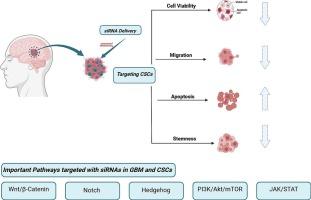胶质母细胞瘤治疗:领域现状与未来展望。
IF 5.2
2区 医学
Q1 MEDICINE, RESEARCH & EXPERIMENTAL
引用次数: 0
摘要
胶质母细胞瘤(GB)是一种源自胶质细胞的癌症性脑肿瘤,每年导致数千人死亡,五年生存率仅为 6.8%。脑胶质母细胞瘤的治疗方法包括手术、化疗、放疗和免疫疗法。脑胶质瘤是一种无法治愈的致命疾病,因此有必要开发创新战略,以找到有效的治疗方法。基因疗法可识别多种基因的突变和扩增,这些突变和扩增是其增殖和扩散的驱动力,因此基因疗法可能是治疗 GB 的关键。使用小干扰 RNA(siRNA)提供了一种新技术,用于抑制与疾病相关的基因,为 GB 及其干细胞群的靶向治疗奠定了基础。这篇综述探讨了 siRNA 在 GB 中的应用,强调了 siRNA 在抑制与肿瘤发生、侵袭、干细胞和对标准疗法的耐药性有关的关键癌基因和信号通路方面的有效性。基于 siRNA 的基因沉默技术是开发针对 GB 及其相关干细胞群的靶向疗法的一种很有前景的方法,有可能提高这种毁灭性疾病的患者预后和生存率。本文章由计算机程序翻译,如有差异,请以英文原文为准。

Glioblastoma therapy: State of the field and future prospects
Glioblastoma (GB) is a cancerous brain tumor that originates from glial cells and leads to thousands of deaths each year and a five-year survival of only 6.8 %. Treatments for GB include surgery, chemotherapy, radiation, and immunotherapy. GB is an incurable fatal disease, necessitating the development of innovative strategies to find a developing effective therapy. Genetic therapies may be crucial in treating GB by identifying the mutations and amplifications of multiple genes, which drive its proliferation and spread. Use of small interfering RNAs (siRNAs) provides a novel technology used to suppress the genes associated with disease, which forms a basis for targeted therapy in GB and its stem cell population, which are recognized for their ability to develop resistance to chemotherapy and tumorigenic capabilities. This review examines the use of siRNAs in GB, emphasizing their effectiveness in suppressing key oncogenes and signaling pathways associated with tumor development, invasion, stemness, and resistance to standard treatments. siRNA-based gene silencing is a promising approach for developing targeted therapeutics against GB and associated stem cell populations, potentially enhancing patient outcomes and survival rates in this devastating disease.
求助全文
通过发布文献求助,成功后即可免费获取论文全文。
去求助
来源期刊

Life sciences
医学-药学
CiteScore
12.20
自引率
1.60%
发文量
841
审稿时长
6 months
期刊介绍:
Life Sciences is an international journal publishing articles that emphasize the molecular, cellular, and functional basis of therapy. The journal emphasizes the understanding of mechanism that is relevant to all aspects of human disease and translation to patients. All articles are rigorously reviewed.
The Journal favors publication of full-length papers where modern scientific technologies are used to explain molecular, cellular and physiological mechanisms. Articles that merely report observations are rarely accepted. Recommendations from the Declaration of Helsinki or NIH guidelines for care and use of laboratory animals must be adhered to. Articles should be written at a level accessible to readers who are non-specialists in the topic of the article themselves, but who are interested in the research. The Journal welcomes reviews on topics of wide interest to investigators in the life sciences. We particularly encourage submission of brief, focused reviews containing high-quality artwork and require the use of mechanistic summary diagrams.
 求助内容:
求助内容: 应助结果提醒方式:
应助结果提醒方式:


